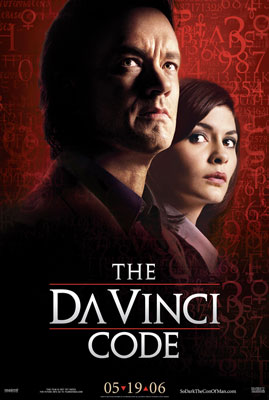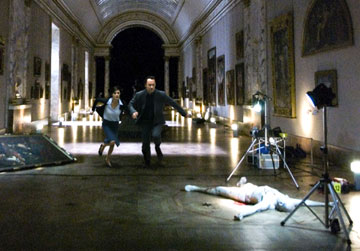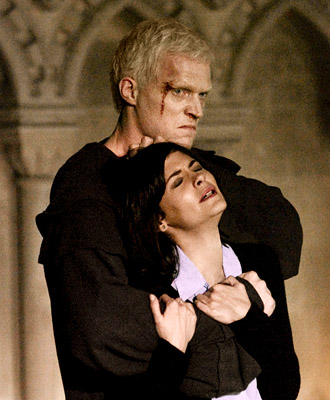

 字體:小 中 大
字體:小 中 大 |
|
|
|
| 2006/05/04 14:25:49瀏覽2634|回應1|推薦28 | |
閑讀–【達文西密碼】 話說在前邊……. ♀醫說文擷字 在4月23日回應在下為電影【達文西密碼】寫的評論,表示了從宗教立場對該小說的質疑後( 附件 1 ),小神手足無措,一直不敢出聲。 讀到有105章小說的第20章的時候,縱使每頁都有英文生字、專有名詞和法文的干擾,還是沒有減少讀興。我想說這是一本有趣的書,但不敢公開挺作者丹‧布郞( Dan Brown)先生,一位高中英文老師。 離5月19日電影全球上演日期不到兩個禮拜了,急著推薦【達文西密碼】給影迷讀者當作「電影院像教室」的英文教科書,可是我必須給一向神往的智慧型女網友♀醫說文擷字 一個說的過去的交代。雖然唸過天主教大學,只在某個聖誕夜捨跳舞而望彌撒,整晚聽到卻都是政治評論。加上疏懶成性,從宗教歷史考據上下手,一定會輸的。 絞盡腦汁,靈機乍現! 美國暢銷書排行榜,向來分小說類( Fiction) 和 非小說類(Non-Fiction),而丹‧布郎的【達文西密碼】確定是一直列於小說類的暢銷榜上。小說是需要有藝術創作發揮空間的,不能像非小說類著作那樣一五一十的引經據典。總算掌握住了想巧辯的中心點。 只是Entry Level的小神我,像「弼馬溫」那樣膨風不具權威性的說法,還是有問題! 神助天助! 今天居然讓我瞎碰到一個由富比士(Forbes) 雜誌資助的寫作教學網站,(www.writingclasses.com)有寫作講師給小說(Fiction)下了個定義( 附件 2 )。大意是說,對尋常百姓,小說基本上是杜選的,不是事實;但是一個好的作家,卻要有本事繪聲繪影,說的故事能跟真有那麼回事似的! 所以我現在放心的教各位朋友,放開宗教,放開考古,放開學者,放開心來學習一位美國高中英文老師的故事,欣賞他如何編排了40,000,000人加一個神花錢買他的書,賺了兩億美金! 附件 1 近日深感困惑的是『達文西密碼』裡熱切討論的「耶穌與馬德蓮~~抹大拉的瑪利亞,是否有夫妻關係與子嗣」的問題,並據以推論教會因此恐懼要迫害馬德蓮,以免耶穌子嗣取代教會勢力。而對該書提出質疑的人剛開始均被冠上「擁教會」之名,使得此書更加暢銷,也模糊了該書作者引用史料之草率、失據(尤其尼西亞會議前後的教眾心態),以及推理上的矛盾。 我從未看過一本書引起這樣多學者的反感,以至目前已經有8本英文版書籍在挑他的錯誤,翻譯成中文的台灣也有幾本(商務、橄欖基金會)。該書作者的名利來得名不符實,不想引起爭議也難。以往,我們總認為具爭議的書籍本身必提出相當驚人、突破性的見解,倒是第一回遇見,一本書是因為其「膚淺」而贏得爭議。 史料部份教會研究人員已提出許多,包括羅浮宮公佈網站上貝律銘金字塔的玻璃片數列錯、最後晚餐的諸多臆測掰得非常勉強,不必我多笑談。最大的笑點當然是--我們稱達文西”Leonardo da Vinci”意指Vinci地方來的Leonardo,沒有人用” da Vinci”來當code name,意思會變成"Vinci來的密碼",和Leonardo就沒有啥必然關係,那裡住的人可多著哩!中文是誤用成習,這點在歐洲則接近「常識水準」。 附件 2 What Is Fiction? In civilian life, the word fiction is sometimes simply used as the opposite of fact. "Me? Dent your fender? That's absolute fiction!" Fiction, in this case, basically means lie. The phrase "Stranger than fiction" also suggests the usually superior plausibility of facts and reality, associating fiction with the unbelievable. In writing, though, good fiction is really all about truth. Not in the sense that your story should be snatched from the headlines (how true are they anyway?) or lifted from your journal, or transcribed from the County Recorder's public record. Your narrative needn't even be possible or plausible in the real world. Consider the suspension of disbelief, yet total resonance, evoked by genres such as science fiction and fantasy. I doubt we would have had to endure so many Frodo Baggins action figures had readers simply put down Tolkien's books after a couple of chapters with a dismissive "Hobbits don't exist." On an even more populist note, think about the enduring fascination with the protagonist as superhero. Let's take Superman. Are his tights stored on the phone booth floor or in his back pocket? Men can't fly! The fact is, if a character or set-up is appealingly wrought, and the essential conflicts of the story (good vs. evil, passion vs. duty, etc.) are timeless and universal, it doesn't matter too much whether you set your piece in a literary replica of your home town and cast your own dad as the protagonist, or whether you write a story set on the planet Pi Forg-Galactin, starring a blue-green alien with six mouths. In other words, a piece of fiction doesn't have to mirror "real life", doesn't necessarily have to seem true to work for the reader. It has to ring true. You'll believe a man can fly! As a writer, believe your story. Believe it so much you can see it. See it, hear it, then write it as though it were true. http://www.writingclasses.com/CourseDescriptionPages/GenrePages.php/ClassGenreCode/FC/type/O#
|
|
| ( 創作|文學賞析 ) |












